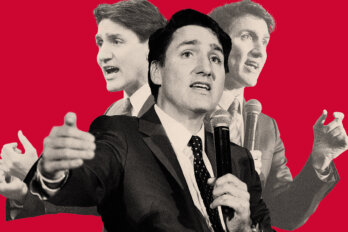In Canada’s spring season of political theatre, the most telling act was quickly forgotten throughout English Canada. It was not Belinda Stronach’s ingeniously timed dart to the Liberals, nor Peter MacKay’s sorrow-in-the-potato-patch interview after her departure. It was not Gurmant Grewal’s antics or Chuck Cadman’s moment of truth. Rather, the most telling event was Gilles Duceppe’s decision not to leave Ottawa to run for the leadership of the provincial Parti Québécois. Duceppe’s decision demonstrated a little-observed fact: that minority government is working.
When Bernard Landry abruptly resigned last spring as leader of the PQ, Duceppe’s move to Quebec City seemed almost inevitable. As leader of the Bloc Québécois in Ottawa he had become the most popular politician in Quebec, and the clear front-runner to lead the cause of separatism provincially. As PQ leader, Duceppe would have had an excellent shot at toppling the unpopular government of Jean Charest in the next election. And then, he might well dream of succeeding where others before him had failed, by winning a referendum on sovereignty.
But Duceppe turned down the opportunity, and his explanation was revealing. “Ottawa and Quebec City are two equally important fronts in this goal of achieving sovereignty for Quebec and making Quebec a country,” he said at a press conference, held not in Montreal or Quebec City but in the precincts of Parliament Hill. Even Bloc founder Lucien Bouchard never gave the federal parliament such credence as a front in the struggle for Quebec.
To what should we attribute Duceppe’s muscular new vision of the Bloc’s role in Ottawa? The answer may be our much-loathed minority government. After more than a decade as the symbol of Quebec’s impotent rage at Ottawa, the Bloc was making Quebec sensibilities felt on issue after issue: nudging the government on Kyoto, sustaining it on same-sex marriage, helping to force a rejection of ballistic missile defence. The irony is that in so doing, the Bloc was unintentionally starting to make parliament work as a representative institution for Quebecers again. Canadians elsewhere should take notice.
Far from the curse we make them out to be, minority governments might just be an improvement on the alternative. Maybe it is our expectations and our way of thinking about our system that needs to change. For more than a decade, Canadians have held to an obsolete image of our political system. The model we seem most comfortable with is that of two essentially similar national parties that take turns at leading stable majority governments. In that model, minority governments reflect an aberration, soon to be corrected at the next election. This image reflected reality during most of our history.
That reality was shattered in 1993, when the Bloc and the Reform Party devoured the old Progressive Conservatives from opposite ends. Since then, two factors have allowed us to cling to the past. First, the Liberals won three successive majorities under Jean Chrétien, helping to sustain the impression of normalcy. Second, the quest to “unite the right” carried an implicit promise: if only the Progressive Conservatives and the Reform/Alliance could overcome their differences, Canada would return to the old system of two large parties alternating in power.
It took the 2004 election, and the messy minority it produced, to lay bare the truth that the old system of majority governments may be gone for good. In last year’s election, the two main parties took the lowest-ever share of votes cast in a Canadian election contested by a united right-wing party. In many of the polls earlier this year, the two leading parties combined failed to get two-thirds of popular support. Majorities will be harder and harder to come by, and we had better get used to it.
Canada’s era of majorities was not without its virtues. We may miss the stability, as well as party loyalty and prime ministerial government, but there are clear advantages to minority governments. Minorities empower the opposition parties—not just the Bloc, in this case, but quite obviously also the ndp. This current parliament might even have empowered the Conservatives, had they only used their clout for more than trying to force an election.
Individual MPs, often marginalized in the majority system, are also discovering their new influence. Stronach’s defection breached a cardinal tenet of the old model: always stand by your party. From that perspective, her decision looked cynical and self-serving, which perhaps it was. In a broader sense, though, Stronach’s move gave Canadians what they were asking for. Her defection reduced the likelihood of a spring election, which voters clearly did not want, and her move would have been unlikely otherwise. In that sense, the system worked, by responding to the preferences of the public. The same mechanism was at play in the case of the late Chuck Cadman, the Independent MP who left his sickbed in British Columbia to help sustain the Liberal government—not because he embraced its policies, but because his constituents told him it wasn’t yet time to go to the polls.
Moreover, a fragmented parliament creates openings for different voices. In time, potent cross-party caucuses might emerge, representing urban or agricultural interests, gays or the religious, creating new centres of power. In this parliament Tory MP Loyola Hearn held his party in suspense over his vote on the Liberal budget while he weighed its supposed benefits to the Atlantic provinces. In the future, we could well see Bloc MPs acting similarly, breaking ranks with their party to take positions important to their constituents. Ironically, the minority government that has been such a headache for Paul Martin may be reducing the “democratic deficit” he has often bemoaned.
The Liberals’ budget deal with Jack Layton could be seen through the same prism. In old-think, the deal was no more than a desperate attempt by the governing party to survive, which may be true. But that compromise also increased funding for housing, education, and foreign aid, areas that enjoy broad public support. And shouldn’t the Liberals, who received just 37 percent of the vote in the 2004 election, be expected to compromise? Getting the support of the ndp, who won 16 percent of last year’s vote, meant the Liberals had cobbled together a majority not only in parliament but also, in a sense, in the country. When Chrétien won a majority in parliament in 1997 with just 39 percent of the vote he had no need to compromise, and he didn’t.
Minority governments aren’t perfect. They will not, for example, eliminate the threat of separatism. But the Bloc’s new potency in Ottawa is subtly weakening the sovereigntists’ case by increasing Quebecers’ ability to have their voices heard within the system. And if the separatists lose another referendum, Bloc MPs may increasingly be tempted into the federalist camp by the attraction of wielding power, just like Stronach. Or like Bouchard, who took the “beau risque” of joining Brian Mulroney’s Tories. Bouchard ultimately returned to the separatist fold, but another Bloc co-founder, Jean Lapierre, now sits in Martin’s cabinet.
Others will argue that in a minority system larger parties can sometimes become slaves to the smaller parties that sustain them, giving obscure sectional interests a clout that’s disproportionate to their numbers in the population. But there’s a solution to that too. If the public objects to political small fry playing too major a role, the parties that once sought majorities might start to think what was unthinkable in the old model—a Liberal-Conservative coalition. After all, on many economic and fiscal policies the two parties broadly agree. Stephen Harper may never be prime minister, but he could be minister of finance. That might even put a smile on his face, proving that minority governments can sometimes succeed where all else failed.





